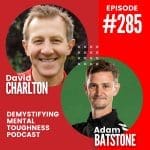
Sports Psychology Tips: Managing Stressful Times
Make exercise a daily habit
Right now, an entire generation across the globe are experiencing a new and seriously challenging event. The coronavirus pandemic has meant that we have all had to make some considerable changes to how we go about our days.
Children aren’t at school, therefore, many are being looked after by one or both parents or carers – leaving many people climbing the walls, and that’s not the children! As schools are shut, teaching staffs’ jobs are very different to what they normally would be – frantically putting together learning resources online. Businesses, where possible, are operating remotely from peoples’ homes. While sport has effectively stopped – indefinitely.
Buzzwords that appear in the media are uncertainty, change, panic, stress, pressure, helpless, worried, anxious and many more.
So how can we get through this difficult time, a positive and resilient mindset is one way and below I’ll talk about 3 other ways to manage your Mental Health.
Why should I manage my Mental Health?
Outbreaks like the Coronavirus (COVID-19), can be very scary and can have a big impact on our mental health. It is important to stay informed and listen to the right sources.
The government are currently telling us to stay at home and only go outside for food, health reasons, exercise or essential work. For details see the government website.
What will this mean?
For some people, it won’t be an issue – people who are home birds and who enjoy being in their own company it won’t phase too much. I’m generalising here as people’s personalities differ, however, if you are a runner, cyclist or golfer it may not affect you as much as say a footballer, rugby player or hockey player. Athletes who take part in individual sports are more used to and quite like the peace of training by themselves whereas the team player can sometimes struggle with this as they love being around the group and go on to miss the camaraderie and banter.
If my mental health is suffering what may happen?
Because of the changes to your daily routine, future worries and social isolation you might notice that:
- You become irritable with loved ones.
- You may be a little restless or feel stir-crazy.
- Some people can go on to experience sleepiness.
- Others have problems sleeping at night.
- Many people may feel more angry than normal.
- Feelings of helplessness may be another sign.
- Your body may feel more tired and tense than normal.
So what should you do:
1. Focus on one day at a time
Getting ahead of yourself and spending too much time in the future can make you feel overwhelmed and helpless. Look to create your future through putting in place helpful daily routines, contributions, achievements and results.
For example, look to eat a balanced, healthy diet or do some exercise first thing in the morning.
2. Focus and set yourself some daily and weekly goals
Goal setting is a tried and tested method which many athletes and fitness fanatics use regularly. It can be very motivational and help to give you confidence. I’d encourage you to give it a go and use the SMART principles, Specific, Measurable, Attainable, Realistic and Time Framed.
You may even want to follow my lead.
My goals for last week were to do 20 minutes of indoor body weight exercises every day around my work and looking after 2 young boisterous boys. In the sessions, I went on to challenge myself with 40 mountain climbers and 40 press ups each day. As a result, I feel like I’ve achieved something and feel pretty good in myself and I’m now looking forward to attempting 45 of both exercises each day this week.
3. Focus on what’s available to you
When difficulties arise, it’s very easy to look at the things missing in your life. Be that being able to go to the gym to train, go out to work as you normally would, train or practice your sport, grab a coffee in a Costa with friends, go shopping for some nice clothes (if that’s your thing – it’s not mine!) or go off hiking for a day.
By looking at the things that you cannot do, it can paralyse you into feeling helpless. Where you find it very difficult to make decisions and take action. So I’d encourage you to think about what is available to you.
In the case of exercise:
You’ll likely have enough room to lie down. If that’s the case you’re in business. You can do many body weight exercises where no equipment is needed.
Perhaps you don’t own any weights but have a rucksack in the wardrobe – could you fill it with some tins or other items to add some weight so that you can do some lifting or more difficult squats.
Do you have space in your garden to do some shuttle runs if you can’t get out for a run because of small children?
Or may be you’re one of the lucky ones and have a rusty old treadmill, rowing machine or exercise bike in your house…Get using it!
Why should I bother exercising regularly?
Scientific evidence tells us that exercising is good for our mental health in the following ways:
- General Well Being
With improved mental health there is likely to be a short term benefit that will reinforce your exercise training. In other words if you make daily exercise a priority you’ll remain more motivated, you’ll have increased energy levels, lower stress levels and your mood will likely be lifted after exercise too.
- Mood
Anxiety and depression could be side effects of such a tough period and are common clinical disorders today. Exercise as a therapy can be a very useful treatment to manage and overcome these disorders.
- Sleep
Some people can experience sleeping issues when their life and routines are thrown into turmoil. Exercise can be very helpful in regulating sleeping patterns.
- Self Esteem
A person’s self-concept and identity may be shifted significantly during this period. Perhaps you had a job that you loved and now are in a position where you aren’t working or you are the main carer for the children. That is a big shift in identity in such a short time. This is where setting yourself some realistic goals and ensuring you have created an environment that promotes feelings of mastery, competence and positive body image are important.
- Cognitive Functioning
Exercise is great for our minds too. Even simply going out for a walk can be helpful and according to research is likely to reduce cognitive decline in older adults. Whether you are young or old, I’d encourage you to create a stimulating environment around you and challenging yourself, creating a brain and body workout. Making some exercises mentally complex, changing up your environment from time to time and trying different athletic drills that you don’t normally do are great ways to go about this.
In summary, we are all going through a period of transition right now, some will be impacted more than others. Some will feel it more than others. We all have choices to make about whether we value our mental health and how we can help ourselves feel better.
So, I hope this article makes you think and you go on to make some positive adjustments to the way you go about your day.
If you’d like to learn more about ways to help your mental health during this challenging time be sure to sign up to “The Mental Edge” for tips and advice.
Or to get in touch for one 2 one Sports Psychology Coaching to improve your well-being with a Leading Sport Psychologist, David Charlton, based near Newcastle upon Tyne – Face to face, via the telephone, SKYPE or online via email available.

Best Wishes
David Charlton
Global Sports Psychologist who is located near Newcastle Upon Tyne, UK and willing to travel Internationally. David also uses online video conferencing software (Zoom, Facetime, WhatsApp) on a regular basis and has clients who he has supported in USA, Canada, South America, UAE, Australian and New Zealand.
Managing Director – Inspiring Sporting Excellence and Founder of The Sports Psychology Hub. With over 10 years experience supporting athletes, coaches, parents and teams to achieve their goals, quickly.
T: +44 7734 697769







